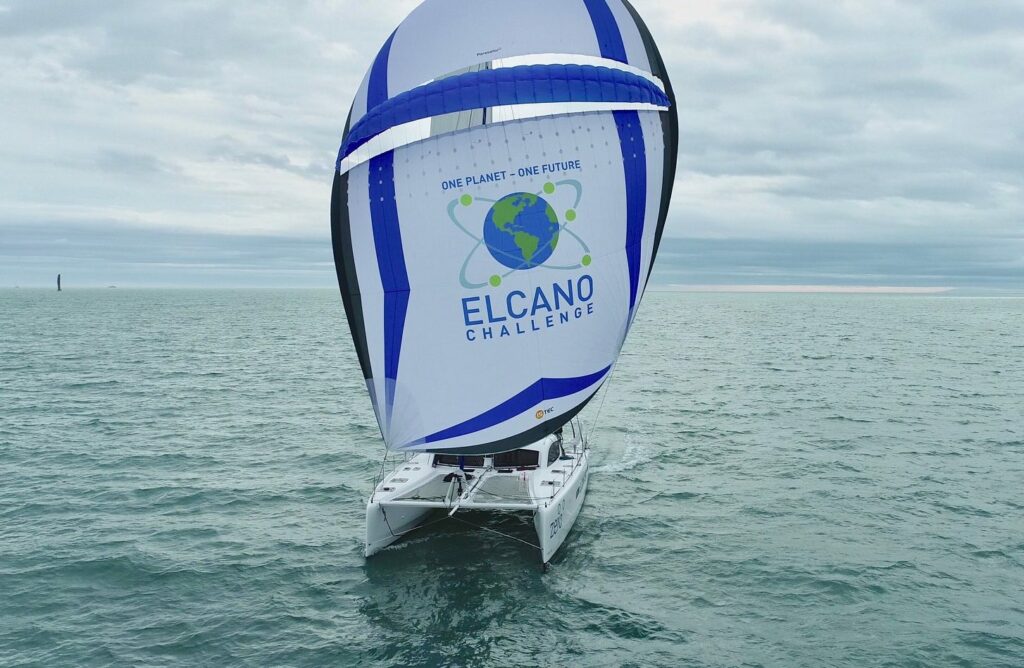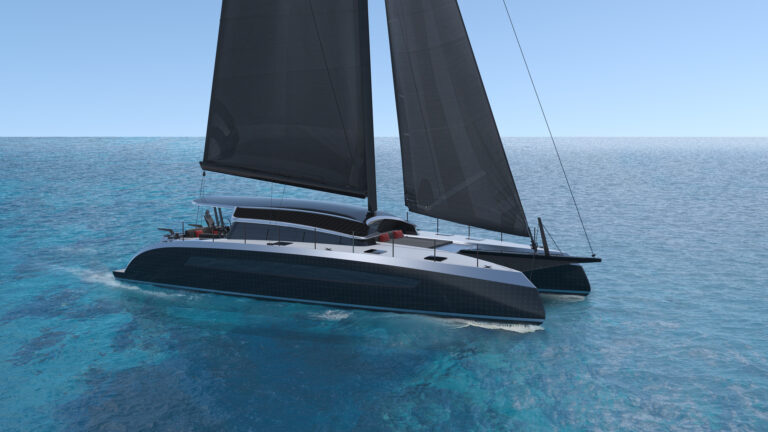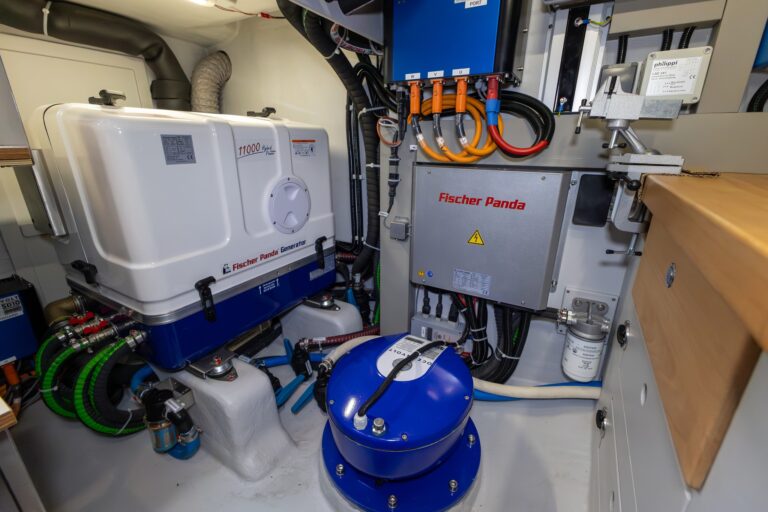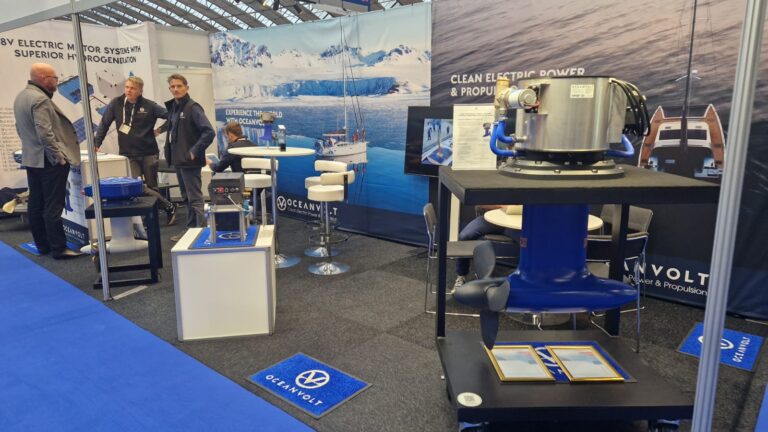
Facts behind the “Electric Shock” article
Jimmy Cornell made the wise decision to end his attempt to travel around the world in Magellan’s footsteps with a 100% electric boat. It is a great disappointment for the teams at Outremer, Oceanvolt and E-NAV Systems who have worked hard to deliver the boat on time in the context of the current health crisis.
Last week we welcomed Jimmy and his crew back at La Grande Motte.
Pending a detailed analysis of the information gathered during this trip, it is time to give some initial explanations:
- The hydro-generation system of the Oceanvolt motors worked perfectly during the tests in La Grande Motte and the first trip to Seville.
- The specifications took into account very economical on-board consumption for 2 crew members. It does appear that the shift to 4 crew members and the use of energy-intensive equipment contributed to the scarcity of resources during periods of no wind.
- Hydrogeneration in manual mode, which is necessary in rough seas, requires a strong appropriation of the system by the crew, whose learning period of a month on a new boat was probably not enough.
- 100% electric navigation requires even more emphasis on heading speed in order to optimize electricity production.
We retained very positive points in this experience but also points for improvement:
- Jimmy Cornell and his crew still covered over 3000 miles without fuel with only 3 marina stops. This is already much more than a classic boater’s program. With the addition of a small generator in addition to hydrogeneration and solar panels (during long periods without wind), the solution covers the needs of cruisers and long journeys.
- The two 15 KW electric motors have shown that they can replace 30 hp diesel engines in propulsion mode.
- The maneuverability of the electric boat in the marina thrilled the crew members who tried it.
- We need to improve the readability of the information relating to the consumption of the motors but also that of the on-board equipment.
- The hydro generation mode in heavy seas must be further optimized.
- Solutions have been proposed and a work program has already been drawn up with close collaboration with Outremer.
We thank Jimmy Cornell and the Outremer teams for their trust and commitment!
Below the official press release from Outremer Catamarans
PRESS RELEASE 8.12.2020
ELCANO 500 Challenge A technical and tactical return to port
Jimmy Cornell set out to circumnavigate in the wake of Ferdinand Magellan without using any fossil fuels, and has taken the difficult but responsible decision to turn back. With reduced preparation time, the technological challenges and all the consequences they would have on the voyage had not been perfectly mastered. The most experienced skipper imaginable and his young crew were facing a lack of power on board, something incompatible with the long passage ahead of them. But just like the sailors in the Vendée Globe Race or those on taking on the Ultim records, they know that Everest hasn’t been climbed at every attempt, and even more rarely on the first go. The forced return to port is certainly a disappointment, but it is accepted as a step often necessary for the most ambitious challenges, in order to get back on course and succeed.
Despite all the efforts made both by Outremer to build the boat in record time, by Oceanvolt to deliver a high-performance electric propulsion system, and by the crew to get to grips with this unique prototype, the timing has proved too short for so great a challenge. The time available was reduced by the unprecedented health crisis that the world has been going through since last winter. What’s more, the season for entering the Strait of Magellan at 53°S is short. So, the decision was taken to return to port and to learn all the lessons from this first round trip of 3,000 nautical miles from La Grande Motte, in France, to the Canary Islands via Sevilla and back.
Beyond the inevitable technological evolutions already being studied at Oceanvolt, with for example a clearer information system, this first trial run has been rich in lessons to be learnt. The performances achievable by the Outremer 4.zero should lead to a specific weather-routing strategy using hydrogenation as the only means of battery charging. In the absence of the back-up solution usually provided by a generator, the way of life on board is more impacted than the theoretical calculations would suggest. Reflections will therefore have to made to adapt our behaviour to a carbon-free future. A real-life lesson for a future that is perfectly in line with the CSR approach initiated by our company.
In the meantime, we’re borrowing a quote from Nelson Mandela: “I never lose: either I win, or I learn”. Outremer is delighted to be accompanying a pioneer such as Jimmy Cornell in learning these new technologies. We look forward to seeing you very soon for the continuation of this exciting challenge, on a truly “extraordinary” boat, says its skipper.
Press contact: Matthieu Rougevin-Baville +33 (0)6 19 22 36 90 matthieu.rb@catamaran-outremer.com
About
Outremer 4.zero
Based on the shipyard’s best-seller, the Outremer 45/4X, the 4.zero is a prototype aimed at testing a zero-emissions solution, which uses two electric motors. At the initiative of the experienced Jimmy Cornell, the ambition is to reproduce the voyage undertaken by Ferdinand Magellan around the world 500 years ago, without using any fossil fuel energy on board. The interior, deck and rig remain completely identical to the production model, providing performance, space and comfort for the entire crew. Length: 14.63m (48’) – Beam: 7.15m (23’6”) – Displacement: 8.7t – Motors: 2x15kW – Batteries: 56kW
Outremer Yachting Since 1984, Outremer has been building safe, seaworthy and comfortable catamarans, specially designed for long-distance cruising in complete serenity. Performance and sensations are an integral part of Outremer’s DNA. These qualities are found in the aesthetics and characteristics of our catamarans. 300 boats all across the world, and millions of nautical miles sailed, have created a truly unique owner’s community. Their experience provides a basis for reflection and on-going improvements that make Outremer a key player in blue water cruising around the world.
Grand Large Yachting Founded in 2003 by Xavier Desmarest and Stéphan Constance, the Grand Large Yachting Group comprises five shipyards and two service companies, located in France and the United States. The expertise of the teams enables the Group to be present in three maritime markets: yachting, professional vessels, and services. The international leader in the blue water cruising market, Grand Large Yachting is notably recognized for its production of catamarans and monohulls specially designed for blue water cruising.


